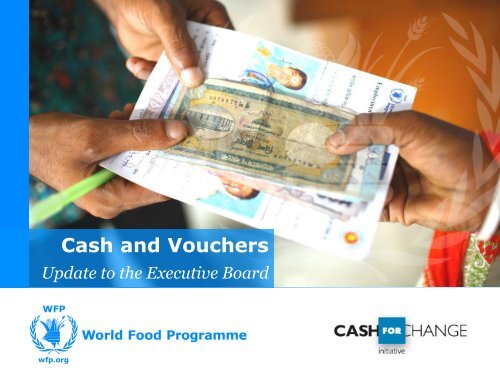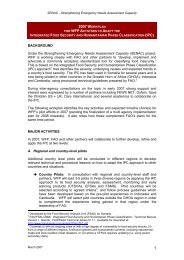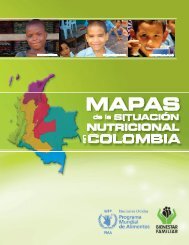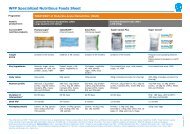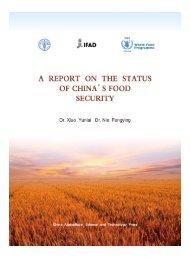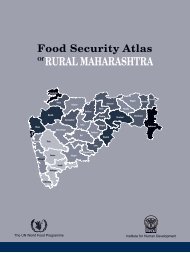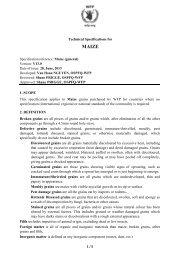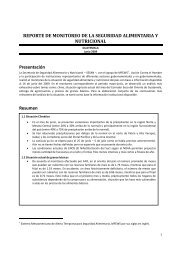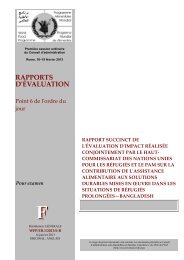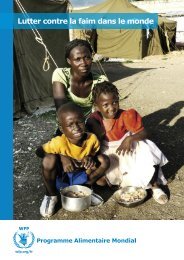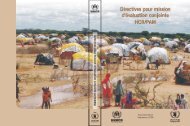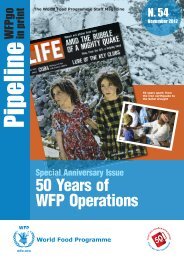Cash and Vouchers - WFP Remote Access Secure Services
Cash and Vouchers - WFP Remote Access Secure Services
Cash and Vouchers - WFP Remote Access Secure Services
- No tags were found...
Create successful ePaper yourself
Turn your PDF publications into a flip-book with our unique Google optimized e-Paper software.
<strong>Cash</strong> <strong>and</strong> <strong>Vouchers</strong>Update to the Executive Board
Briefing Structure1. Context2. <strong>Cash</strong>-for-Change Structure3. <strong>Cash</strong>-for-Change Road Map4. Current Portfolio5. Priorities for 2013
Context
Context• Institutional Shift– Food Aid to Food Assistance• <strong>WFP</strong> as a Leader in Food Assistance– Implementing Scalable <strong>Cash</strong> or Voucher transfer Programmes– Establishing Systematic Approaches <strong>and</strong> Cross-Functional Business Processes– Setting St<strong>and</strong>ards for Evidence Based Decision-making• Renewed Focus on Value for Money– Cost-Efficiency <strong>and</strong> Effectiveness– Establish processes for selection of most appropriate Transfer Modality• Call for Country-led, Country-Owned Safety Net Programmes– Enhance <strong>WFP</strong> ability to support governments in developing safety nets <strong>and</strong> other homegrownsolutions for hunger <strong>and</strong> malnutrition– Stronger Partnerships with government– Increasing role for private sector support‘Modern <strong>WFP</strong> is problem-based rather than instrument-based’
<strong>Cash</strong>-for-Change Structure
<strong>Cash</strong>-for-Change Governance– Steering CommitteeMembers: Division DirectorsSteeringCommittee– <strong>Cash</strong>-for-Change Service<strong>Cash</strong>-for-ChangeService– Stakeholders GroupMembers: Service ChiefsStakeholders Group
<strong>Cash</strong>-for-Change StructureRB Field SupportTeamODNODJODDODPODBODC<strong>Cash</strong>-for-ChangeServiceProgrammeInnovation Team• Best Practice &Learning• Quality Assurance& St<strong>and</strong>ardisation• Partner AdvocacyCross-DivisionalCoordination Team• Tools & GuidanceDevelopment• Training & CapacityBuilding
Funding <strong>and</strong> Partnerships• Funding• ECHO• Sweden• Multilateral• Partnerships• UNHCR• IFPRI• CALP• MasterCard
<strong>Cash</strong>-for-Change Roadmap
Reaching Scale<strong>Cash</strong>-for-Change Road Map2011 2012 2013Phase 1 Phase 2 Phase 3CapturingInnovationLeveraging Innovation& Building CO CapacityFacilitatingScalable Deployment• Reviewing Pilots &Lessons Learnt• Identify Best Practices<strong>and</strong> Challenges• Define Corporate C&VDistribution Models• Establishing BusinessProcesses• Cross-Functional Roles<strong>and</strong> Responsibilities• Guidance & Toolsdevelopment• Training• Roll-out corporate tools• Enabling Scale-Up• Developing, EnhancingPartnerships• Forecast ResourcePotential
Phase 1 Review - Capturing Findings Innovation• Pilot Phase Produced Strong Innovation– A wide variety of new approaches, partnerships <strong>and</strong> technologies• New Approach, New Risks– Adoption of new business areas <strong>and</strong> new partnerships has inevitablybrought new risks <strong>and</strong> liabilities for <strong>WFP</strong> Country Offices to mitigate.• Common Challenges:– use of new ways of working;– procurement of new service providers;– limited of experience & capacity;– lack of clarity on roles & responsibilities; <strong>and</strong>– procedural challenges.• Changes in traditional COs’ business model:– Exp<strong>and</strong>ed operational roles for Programme <strong>and</strong> Logistics; <strong>and</strong>– New operational role Finance <strong>and</strong> ICT units.
Phase 1 - Capturing Innovation• Identification of St<strong>and</strong>ard Models– St<strong>and</strong>ardised design methodologies;– Defined business processes;– Rationalisation of delivery mechanisms; <strong>and</strong>– Provision of Corporate IT solutions.• Enabling Common Capacity– Improved coordination (internal / external)– Streamlined, Cross-Divisional Roles <strong>and</strong> Responsibilities– Provision of Corporate Field Support to Country Offices– Enhanced corporate underst<strong>and</strong>ing at all levels‘From 40 models to 4 models’
Phase 2 – Streamlined RolesSummary of Core Responsibilities for the Development <strong>and</strong> Delivery of <strong>Cash</strong> <strong>and</strong> Voucher Business ProcessesNeeds Assessment <strong>and</strong> Response Analysis Intervention Setup ImplementationDistribution ReportingLogistics ProgrammeFood Security,Nutrition <strong>and</strong>MarketAnalysesNoStopNeeds?YesGovernmentPolicies <strong>and</strong>Safety NetsCP CapacityAssessment &Operational RiskAnalysisLocal RetailSupply ChainAssessment &Operational RiskAnalysisEffectiveness,Operational Risk<strong>and</strong>ExternalitiesCost-EfficiencyAnalysis -(Omega Value)TransferModalitySelectionCP SelectionRetailerSelection(VoucherOperations)St<strong>and</strong>ardOperatingProceduresBeneficiaryRegistrationDistributionPlanning <strong>and</strong><strong>Cash</strong>/VoucherTransferRequestResourceAvailabilityCertificationMonitoring(e.g. BCM,PDM)MonitorTransferDelivery (<strong>Cash</strong>or Voucher)Reconciliationof BeneficiaryFigures <strong>and</strong>TransferAmountDistribution(POCB)Service ProviderInvoiceVerification(PODA)Request CPServicePaymentsRequestServicePaymentRequestRetailersPaymentsFinanceFinancial SectorAssessment &Operational RiskAnalysisFinancialService ProviderSelectionEffect Transferto DedicatedAccountsEffect Transferto Beneficiaries(<strong>Cash</strong> orVoucher)Perform BankReconciliationEffect CP, FSP<strong>and</strong> RetailerPaymentsICTICT CapacityAssessment &Operational RiskAnalysisIT SolutionSelection <strong>and</strong>TestingTrain Partnersin IT SolutionUseSupport Use ofIT Solutionwithin <strong>WFP</strong> <strong>and</strong>PartnersProcurementRFPs Issued <strong>and</strong>AnalysedContractsSigned
Phase 2 - Evidence-Based SelectionOperations Directive• COs should use the set of transfer modalitythat best meets the needs of beneficiaries.Determining Feasibility:• Preferences, Food Security <strong>and</strong> MarketContexts• Sectoral Capacity Assessments• Cooperating Partner Capacity• National Policies• Security <strong>and</strong> Risk ContextSelecting the Appropriate Responses:• Responses must be evidence-based <strong>and</strong> shouldbe cost-efficient, effective <strong>and</strong> appropriate.‘Food-based interventions are not the default intervention’
EffectivenessEvidence-Based SelectionCombining Efficiency <strong>and</strong> Effectiveness for decision makingHMore EffectiveLess EfficientMore EffectiveMore EfficientLLess EffectiveLess EfficientLess EffectiveMore EfficientLEfficiencyH
Phase 2 – Research Collaboration<strong>WFP</strong>- Government of Spain Collaboration 2009-2013• Captures operational lessons <strong>and</strong> evaluates comparative costefficiency<strong>and</strong> effectiveness of cash, food <strong>and</strong> vouchers.• Using rigorous evaluation techniques, <strong>WFP</strong> <strong>and</strong> IFPRI havecollaborated in Ecuador, Niger, Yemen, <strong>and</strong> Ug<strong>and</strong>a.Ecuador Findings• <strong>Vouchers</strong> led to the highestincrease in household foodsecurity ;• <strong>Vouchers</strong> were found to bemore cost-effective inincreasing caloric intake <strong>and</strong>dietary diversity.Ug<strong>and</strong>a Findings*• <strong>Cash</strong> led to the highest increasein household food-security;• Food transfers increased theconsumption of CSB,particularly for children undertwo years.
Capacity <strong>and</strong> GuidanceField Support Function Established– Full Rome Office <strong>and</strong> Regional Bureaux Established– Country Specific Strategies Developed– 57 Field Support Missions UndertakenCapacity-Building Programme Launched– Three-Tier Training Strategy Established• Decision Makers (CDs, RDs)• Mid-Level Management (National Officers, P3—P5)• Implementers (GS, P1—P2)– Cross-Functional Training Programme Rolled-Out• 250 staff trained to date– E-Learning Module Under Development
Capacity <strong>and</strong> Guidance• Financial Procedures– Directive Under Approval– Revised Accounting PracticesCorporate IT System Development– Modular system supportingbeneficiary management, cash orvoucher distribution, <strong>and</strong>reconciliation– Piloting underway in Sudan, Kenya,Somalia <strong>and</strong> DRC.
Current Portfolio
Growth of <strong>WFP</strong>’s C&V portfolioApproved C&V Transfers (Million USD)400350300250200150100• Since 2009, there has beenan eight-fold increase inthe approved C&Vprogramme of work;5002009 2010 2011 201227%15%2012 C&V Portfolio6%<strong>Cash</strong> Account49%15%43%Immediate <strong>Cash</strong>E-VoucherP-Voucher45%EMOPPRRODEV
<strong>WFP</strong>’s 2012 Portfolio1800160014001200100080060040020006754101 10418 16ODB ODC ODD ODJ ODP ODNApproved Programme of Work by RB in 2012 (million USD)C&VIn-kind
RegionalBureau<strong>WFP</strong>’s 2012 PortfolioProportion ofGlobalProgramme ofWorkCV Proportionwithin BureauxPortfolioODC 18% 11%ODD 19% 11%ODP 3% 11%ODJ 4% 8%ODB 22% 5%ODN 34% 4%
Future Priorities
Facilitating Scalable DeploymentImproving Field-based Decision-Making– Transfer Modality SelectionFull Integration of C&V TransferModalities– Determine the Optimal Use of <strong>Cash</strong> <strong>and</strong><strong>Vouchers</strong> in <strong>WFP</strong>’s country portfolioContinuing to St<strong>and</strong>ardise <strong>Cash</strong> <strong>and</strong>Voucher Deployment– Use of Core Distribution Models– Corporate IT System
Partnership <strong>and</strong> CoordinationIncreasingly Conducive Environment– Increasing opportunities for collaborationCapacity <strong>and</strong> Limitations– Market, Partner <strong>and</strong> Service Provider capacity remains a criticallimitationPartnership Dialogue <strong>and</strong> Coordination– <strong>WFP</strong> should play a greater coordination role– Partnership dialogue should take account of changing roles <strong>and</strong>responsibilities of all playersLink to Government-Based Systems– <strong>WFP</strong> must enhance its capacity to support, develop <strong>and</strong>/or utilisegovernment-based systems
Conclusion


